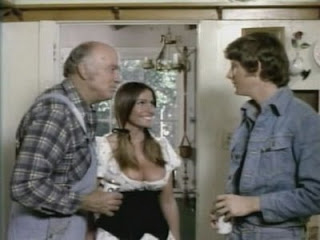This might be the nastiest movie Russ Meyer ever made -- and that's including Blacksnake.
If Supervixens showed how Meyer could update his style to serve the tastes of New Hollywood, Up! is the complete opposite.
It turns out cartoonish violence is not so much fun when the blood and gore look realistic. And the way the women are treated in this movie...
Every directorial decision is so specifically wrong-headed, so completely tone deaf to most definitions of taste that it is both nauseating and hypnotising at the same time. You just cannot look away.
The story is impossible to follow, so this review is just going to be a list of lowlights.
You might be wondering what this has to do with the movie. The answer is almost nothing.
The next couple of minutes are filled with montages of other characters enjoying each other's company while a naked woman wanders the forest and monologues about... something. I don't know. This movie makes absolutely NO SENSE.
We then meet our protagonist, played by Raven de La Croix. She looks like Kat Denning's older sister, and her performance is actually pretty similar to the Broke Girl -- aside from the nude karate.
Anyway, this is the point where the movie goes from pleasingly bizarre to actively offensive.
Raven winds up in a town where everyone wants to have sex with her, and consent is not on the menu. Despite beating up plenty of dudes, Raven winds up attacked multiple times.
For reasons know exclusively to himself, Meyer decides to play these scenes like Looney Toons. Combining ultra-realistic violence, rape and cartoon sound effects, Up! is the one film in Meyer's canon that feels like a sleazy exploitation movie.
All of his other movies, even the darker ones, never went this far. But then again, Meyer's earlier films had to abide by the censorship practices under the Hays Code. After the Code ended in the late 60s, the gloves were off -- and Meyer decided he had to up the ante.
To wrap up the plot, the male characters wind up killing each other or getting killed by Raven, who then has to face off against the real villain of the piece (and Hitler's killer), his daughter Alice (Janet Wood).
The movie runs out of steam about 15 minutes in and it is a slog to get through.
Raven is pretty watchable, and is good with pithy one-liner. It's just too bad Meyer didn't give her another, better vehicle.
The rest of the cast is a collection of nobodies. For once, Meyer's talent for weird faces and odd characters fails him. Other than Raven and Edward Schaaf's Hitler, they are just not memorable or interesting in any way. This movie really misses the idiosyncratic charms of Mickey Fox, Stuart Lancaster and Charles Napier.
In closing, Up! is not good. If you want to see Meyer go off the deep end, you might like parts of it. Watch the Hitler stuff for some chuckles, and then switch it off.
Russ Meyer will return with Beneath The Valley Of The Ultravixens!
For previous entries...
The Meyer Files #1: The Immoral Mr. Teas (1959)
The Meyer Files #9: Mondo Topless! (1966)
The Meyer Files #11: Good Morning and... Goodbye! (1967)
The Meyer Files #12: Finders Keepers... Lovers Weepers! (1968)
The Meyer Files #13: Vixen! (1968)
The Meyer Files #14: Cherry, Harry & Raquel! (1969)
Interlude
The Meyer Files #15: Blacksnake! (1973)
The Meyer Files #16: Supervixens! (1975)
The Meyer Files #10: Common Law Cabin (1967)
The Meyer Files #11: Good Morning and... Goodbye! (1967)
The Meyer Files #12: Finders Keepers... Lovers Weepers! (1968)
The Meyer Files #13: Vixen! (1968)
The Meyer Files #14: Cherry, Harry & Raquel! (1969)
Interlude
The Meyer Files #15: Blacksnake! (1973)
The Meyer Files #16: Supervixens! (1975)




























